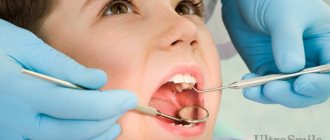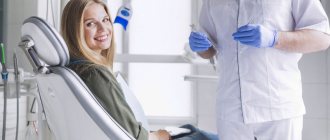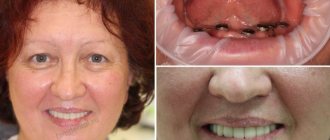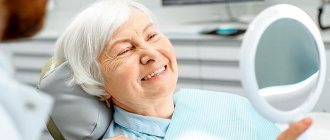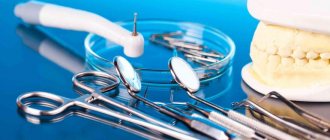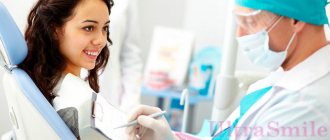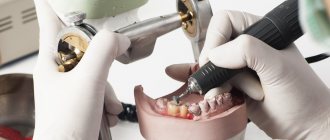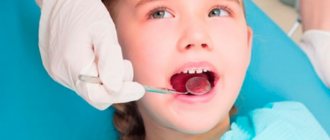Treatment in a dream
What is the advantage of the drug "Sevoran"?
How is treatment performed under Sevoran sedation?
Indications for dental treatment with sedation
When is sedation contraindicated?
A child's trip to the dentist is always stressful. He may be afraid of unfamiliar people, new surroundings, and the need to stay in one position for a long time will simply exhaust him. However, not all parents think about this in time: very often they bring their child to the doctor when there is no longer time to delay and the tooth needs immediate treatment. Such a stressful day can result in psychological trauma for the child.
Sedation can help solve this problem.
- a medical procedure during which a child is put into a state of sleep.
Dental treatment in a dream helps to avoid negative emotions, anxiety and discomfort. In addition, it is completely safe and convenient: while the child is sleeping, the dentist has time to complete the entire scope of work without causing any fear.
In pediatric dentistry "Premiere", a modern inhalation anesthetic "Sevoran" (active ingredient - Sevoflurane) is used for deep sedation for children. This drug has been confirmed to be the safest in the world. It is produced by the famous pharmaceutical company Abbott Laboratories.
Indications for removal
All indications are usually divided into two categories - emergency and planned. Emergency intervention is indicated if the patient has the following diseases and complications:
- abscess;
- lymphadenitis;
- the presence of purulent inflammation;
- impossibility of conservative treatment;
- impossibility of restoring a damaged crown;
- longitudinal tooth fracture;
- sinusitis;
- a completely destroyed tooth;
- phlegmon.
In turn, planned surgical intervention is carried out for the following indications:
- presence of a tumor in the jaw area;
- obstruction of the root canals, complicated by the presence of sinusitis or a cyst;
- atypical and painful position of the wisdom tooth;
- root fracture;
- carrying out orthopedic or orthodontic treatment;
- impacted tooth;
- III and IV stages of periodontitis, accompanied by mobility of the dentition.
Important to remember! The removal process can be considered as an extreme measure, which is resorted to by specialists at the Premier dental clinic. As long as there is a chance to cure and save a tooth, doctors will “fight” for it and provide a full range of services for the treatment and prevention of oral diseases.
Price comparison table
Below are the most popular services and their prices among the listed organizations. All prices are in rubles.
| Service | AGF-Kinder | Premiere | Smile formula | Center Family Dentistry | Medentastar |
| Initial examination | 1500 | 500 | 300 | 600 | 400 |
| Help for kindergarten | 500 | 400 | 500 | 600 | 500 |
| Baby tooth caries | from 2200 | 1500 | from 1500 | from 2790 | from 1600 |
| Molar caries | from 3600 | 2700 | 2500 | 3940 | from 1600 |
| Fissure sealing | 1850 | from 700 | 700 | 400 | 610 |
| Service | Children's clinic | Gulliver | ABC of health | Happy Dent | Amy Dent |
| Initial examination | 500 | 750 | 500 | 300 | 0 |
| Help for kindergarten | 650 | 600 | 500 | 500 | 300 |
| Baby tooth caries | from 1100 | from 2950 | 1500 | from 1500 | from 1000 |
| Molar caries | 4250 | from 5900 | from 1800 | from 1500 | from 1000 |
| Fissure sealing | 800 | 2550 | 950 | 850 | 1500 |
As can be seen from the information above, some institutions belong to the premium segment, therefore, the level there should be higher. However, do not forget that doctors constantly improve their qualifications in any private companies to gain trust. They attend training sessions covering psychological issues on how to calm angry patients. All this allows you to level out children's hysterics in the dental chair.
When choosing between a private and public clinic, it is important to be aware of: does it make sense to wait 2 weeks for a coupon from a municipal institution, and what can happen to a child’s tooth during this period. Paid dentistry is good in terms of getting quick results and a more polite approach, therefore, by choosing them, parents solve the problem at the root. Thus, based on the price table and reviews of ordinary people, you can easily choose where to treat your child.
Which dental clinic in Ufa did you and your child like?
Basic removal steps
Tooth extraction is a rather complex process that should only be performed by specialized dentists.
Important to remember! You should not attempt to remove a diseased tooth yourself. This is fraught with further progression of the disease and complications that will require long-term and expensive treatment.
Typically, surgery includes the following steps:
- taking an x-ray that will help determine the general picture of the condition of the tooth and the topography of its roots;
- collecting the patient’s medical history, which will reveal the presence of allergic reactions and chronic diseases that may be contraindications to the use of anesthesia or removal;
- the use of anesthesia, which allows the removal to be painless for the patient;
- the deletion itself;
- placing a suture on the hole.
On average, the procedure itself takes no more than 20 minutes, during which the patient does not feel pain or severe discomfort.
Types of tooth extraction
Doctors at the Premier clinic practice all types of removal.
- Removal of the upper tooth;
- Removal of the lower tooth;
- Removal of the 8th tooth – the so-called wisdom tooth;
- Removal of impacted teeth, the eruption of which is difficult;
- Removal of a tooth cyst;
- Removal of nerve and tooth root.
In each specific case, the most suitable method will be selected, which will allow the procedure to be carried out as efficiently as possible and absolutely painless for the patient. The main thing is not to avoid regular visits to the dentist, which should become a good habit for everyone and will help maintain oral health.
Types of oral diseases
Dental problems can affect not only the teeth, but also the tissues surrounding them - gums, ligaments and jaw bone. The method of treatment is selected by the doctor, depending on the severity of the lesion and the individual anatomical features of the patient’s dentofacial apparatus.
- Diseases with initial damage to dental tissues . Caries is associated with the development of a defect in dental tissue in the form of a cavity or cavity. Thus, the treatment of caries depends on the depth of the defect and the area of the lesion. Mandatory treatment of the lesion is carried out and its subsequent filling with filling material. The presence of a wedge-shaped defect near the edge of the gum requires a therapeutic course in the form of taking vitamins and professional oral hygiene, or closing the defect with a filling (if it is deep). The need for instrumental treatment of canals in adults and children arises when the loose tissue in the tooth cavity becomes inflamed (pulpitis).
- Diseases affecting surrounding tissues . This includes, for example, cysts that arise near the root of the tooth against the background of inflammatory changes in the surrounding tissues (periodontitis). Treatment of a dental cyst involves its surgical treatment, partial or complete removal.
Removal of baby teeth in children
Most parents mistakenly believe that since the child’s baby teeth are replaced by molars, then they can be removed without fear. But the problem is that premature removal of baby teeth can cause incorrect bite formation in a child, impaired chewing function or pronunciation, and other negative consequences. Therefore, in pediatric dentistry, surgical intervention is carried out exclusively according to the doctor’s indications and only in the most extreme cases. This procedure is absolutely painless for the child and, as a rule, does not cause complications.
When sedation is contraindicated:
- if you suffer from a somatic disease in the acute stage;
- in case of individual intolerance to drugs required for sedation;
- during ARVI.
If you have any questions, you can ask them either on our website or when you meet with an anesthesiologist. Also, do not forget to consult your doctor before the operation: there are contraindications.
Children's dentistry Ufa "Premiere" is located at: st. Ayskaya, 20. We are waiting for you!
Helpful information
Tooth extraction under general anesthesia
General anesthesia is rarely used during this procedure and only according to the indications of a dentist. Such exceptional cases include:
- presence of panic fear in the patient before the upcoming procedure;
- aggravated gag reflex in the patient, which may interfere with the operation;
- high complexity and traumatic nature of the upcoming intervention;
- the patient has an allergic reaction to drugs used in anesthesia. Etc.
We must not forget that the use of general anesthesia can have negative consequences for the human body, especially in old age. In addition, the patient may require an additional recovery period, whereas with local anesthesia, the patient can go straight home after the procedure is completed.
Contraindications to tooth extraction
- Diseases of the nervous system.
- Acute diseases of the cardiovascular system.
- Presence of infectious diseases.
- Beginning of pregnancy.
- The period of menstruation, provided that the patient has poor blood clotting.
- Last stages of pregnancy.
- Mental disorders in the acute stage.
- Regular use of medications that affect the rate of blood clotting.
Important to remember! In each specific case, our doctors will conduct an individual diagnosis of the general condition of the patient and his teeth. This will help identify the presence of contraindications and avoid subsequent complications.
How is treatment performed under Sevoran sedation?
- During the operation, there is an anesthesiologist nearby, whose work experience is more than 20 years. We also monitor blood pressure, pulse, ECG, saturation.
- Treatment is carried out only in a sterile operating room.
- The process involves a team of specialists: a dentist, an assistant, an anesthesiologist, and a nurse anesthetist. Thanks to this, it is possible to complete the work quickly and efficiently. All our doctors are professionals with extensive experience and are trained abroad in the best clinics in the world.
Possible complications after tooth extraction
If you went to a specialized institution and the removal was performed by an experienced dentist, then you don’t have to worry about complications.
The following symptoms are also not cause for concern:
- the presence of slight swelling and bruises in the intervention area, which reach their peak on the third day;
- presence of pain;
- the presence of slight bleeding during the first 2 - 3 hours after the procedure;
- slight increase in body temperature;
- inability to open your mouth wide during the first days;
- dry lips and corners of the mouth.
These phenomena are considered normal and do not require qualified assistance from specialists.
If you experience the following symptoms:
- very severe pain that cannot be relieved with painkillers;
- bleeding that lasts more than 12 hours;
- numbness of the jaw that does not go away within 2 days after the removal procedure;
- very severe swelling or tumor formation after removal, making swallowing and speech difficult;
- an increase in body temperature to 380C or more, which lasts for several days.
In each of these cases, you must immediately seek help from a doctor, which will help avoid the development of complications.
What to do after tooth extraction?
The following simple recommendations will help to avoid complications after the procedure and will contribute to the speedy healing of the wound that formed at the site of the extracted tooth.
- Minimize all physical stress on the body.
- Do not eat or drink for the first 2 to 3 hours after the procedure.
- Do not eat or drink on the side of the extracted tooth for the first 2 to 3 days.
- Do not brush your teeth for 24 hours after the procedure.
- Do not drink alcohol or tobacco for the first 2 to 3 days after removal.
- Closely monitor your general well-being and sensations in the area of surgical intervention.
Important to remember! Most patients believe that after the intervention the mouth must be rinsed periodically. In fact, this is not necessary, and in most cases it is even harmful. Because frequent rinsing does not allow the wound's blood clot to form normally, which can cause complications or infection. You should especially not abuse this in the first period after surgery.
Subsequently, after the clot is formed, the wound begins to heal, but you cannot fully brush your teeth yet; you can use rinsing as a method of maintaining oral hygiene. You can always find out how to rinse your mouth from your doctor. Usually these are decoctions based on herbs - sage, oak bark, chamomile. In exceptional cases, special pharmaceutical solutions may be recommended.
Cost of treatment
The cost of treatment and the price of tooth extraction in Ufa will be determined by a number of factors - types of preliminary diagnostics, complexity of surgery, type of anesthesia used, etc.
Important to remember! You can’t ignore toothache and put off visiting the dentist. The sooner you seek help from our specialists, the greater the chance of saving the affected tooth and avoiding possible complications and expensive treatment.
Subsequent restoration of a lost tooth will also require the help of experienced clinic doctors. Using modern methods and materials, they will restore the beauty of your smile and relieve you of discomfort.
What is the advantage of the drug "Sevoran"?
- The patient falls asleep as soon as he takes a breath.
- The possibility of allergies is excluded.
- No side effects.
- After consuming Sevoran, the child wakes up easily and quickly, and can move independently within 15 minutes.
- All procedures can be performed in one appointment, meaning you can get a healthy smile as quickly as possible.
"Sevoran"
is a certified and licensed medicine that meets all international standards. In Russia it has been used since 2005, and in the USA, Japan and the European Union for the last 22 years. Statistics show that this is the safest drug intended for inhalation anesthesia, and therefore it is ideal for pediatric outpatient dental practice.
